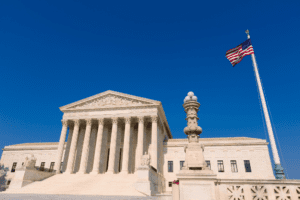 The dissent continued: Although I hope—fervently—that future courts will be able to identify historical analogues supporting the validity of regulations that address new technologies, I fear that it will often prove difficult to identify analogous technological and social problems from Medieval England, the founding era, or the time period in which the Fourteenth Amendment was ratified. Laws addressing repeating crossbows, launcegays, dirks, dagges, skeines, stilladers, and other ancient weapons will be of little help to courts confronting modern problems. And as technological progress pushes our society ever further beyond the bounds of the Framers’ imaginations, attempts at “analogical reasoning” will become increasingly tortured. In short, a standard that relies solely on history is unjustifiable and unworkable.
The dissent continued: Although I hope—fervently—that future courts will be able to identify historical analogues supporting the validity of regulations that address new technologies, I fear that it will often prove difficult to identify analogous technological and social problems from Medieval England, the founding era, or the time period in which the Fourteenth Amendment was ratified. Laws addressing repeating crossbows, launcegays, dirks, dagges, skeines, stilladers, and other ancient weapons will be of little help to courts confronting modern problems. And as technological progress pushes our society ever further beyond the bounds of the Framers’ imaginations, attempts at “analogical reasoning” will become increasingly tortured. In short, a standard that relies solely on history is unjustifiable and unworkable.
Indeed, the Court’s application of its history-only test in this case demonstrates the very pitfalls described above. The historical evidence reveals a 700-year Anglo-American tradition of regulating the public carriage of firearms in general, and concealed or concealable firearms in particular. The Court spends more than half of its opinion trying to discredit this tradition. But, in my view, the robust evidence of such a tradition cannot be so easily explained away. Laws regulating the public carriage of weapons existed in England as early as the 13th century and on this Continent since before the founding. Similar laws remained on the books through the ratifications of the Second and Fourteenth Amendments through to the present day. Many of those historical regulations imposed significantly stricter restrictions on public carriage than New York’s licensing requirements do today. Thus, even applying the Court’s history-only analysis, New York’s law must be upheld because “historical precedent from before, during, and . . . after the founding evinces a comparable tradition of regulation.” Ante, at 18 (majority opinion) (internal quotation marks omitted). A. England.
The dissent’s logic is weak with regard to most of the examples of modern technology that it uses in an effort to show that a historical review cannot address them. For example, it cites to pending legislation in New Jersey regarding “smart guns” that will only fire when controlled by the registered owner. This is a safety mechanism as opposed to an advancement that elevates the potential danger of firearm carriage.
